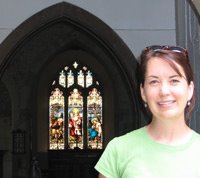45: Divergences (or, the birth of a perfectionist)
The summer I was nine, we packed everything up and drove for six hours through central Texas, hundreds of miles of barren dirt punctuated by the occasional Dairy Queen. Everything changed in Wichita Falls. I went to a public school where nothing spoke of home—everything had a tinge of mediocrity to me, and I felt lost. The teaching was perfunctory and cold, far behind the schools I’d been in. The girls were so different. They were reading Judy Blume books and anxiously waiting for their periods to start. I was reading Little House on the Prairie and The Black Stallion, still playing make-believe. I don’t remember having any friends there; I was the awkward one without anyone to talk to.
Ballet was lost, just when I could have gone on pointe—we couldn’t find a studio. I’m not sure I even told my mom how much I wanted to keep dancing. Instead, the whole family took up tennis; my brother and I had hours of practice every day after school and all summer in the hot sun. Our house on Lou Lane, walking distance from the university, flooded that first spring. Three feet of water floated away baby pictures and ruined shoes. I remember feeling poor, wearing hand-me-down clothes that someone from church brought over, and realizing that now I knew what it felt like—for a brief time, at least—to be in need.
I started making straight A’s. I became a perfectionist. And I started to write.
I can remember sitting on the formal couch in the living room, looking out the tall windows at a rare north Texas snow, writing bad elementary-school poems about God. The journal—brown, with pink and white flowers—has disappeared, but I’m sure I’ll be horrified when I find it. And then there are notebooks of self-indulgent, poorly written journals going back to high school. I can’t throw them away, but I can’t bear to read them, either.
As far as we know, there was none of this for Jane, no self-indulgent scribbling, no journaling about her feelings or about trying to find her place in the world. Her “quiet life” had its share of upheaval. Her first experience at the boarding school in Oxford must have been somewhat traumatic. A few years later, when she and Cassandra were at a different school with their cousin Jane Cooper, a fever broke out. Mrs. Austen and her sister rushed in to get the girls, but their aunt Cooper caught the fever and died shortly after. The household was constantly changing as Jane’s brothers were sent off to school—James and Henry to Oxford, Frank and Charles at a younger age to naval school—and returned home. At twenty, of course, she met Tom Lefroy, and immediately lost him again. Cousin Jane Cooper went on to marry extraordinarily well, only to die in a coach accident several years later, when Jane was twenty-three. At twenty-five she lost the dear family home at Steventon when her parents abruptly announced her father’s retirement and the family move to Bath. At twenty-nine, her dear friend Anne Lefroy died in a riding accident on Jane’s birthday, and then Jane’s own beloved father died, sending the small family unit of mother and two daughters spiraling into something close to poverty. But there’s no record of any of these in Jane’s own hand, other than in the letters that remain.
Another point where we diverge is the source of our writing. I believe Jane wrote because she was a great conversationalist, full of wit in a day when wit was prized, a sharp observer of society. While I write in many ways from weakness rather than strength--I write because I am a poor conversationalist, because there are so many things I can’t sort out in conversation and have to put in print to get right.
Jane wrote for fun, while I write in some ways from need. Perhaps she felt the need to write as well. Perhaps there were days when it was a burden. But when she made 200 pounds on Sense and Sensibility, she spoke of the great return for “that which had cost her nothing.”



2 Comments:
This is so cool! I am thrilled for you!!!
I love reading about your "journey"! Keep writing, Lori!
Post a Comment
<< Home